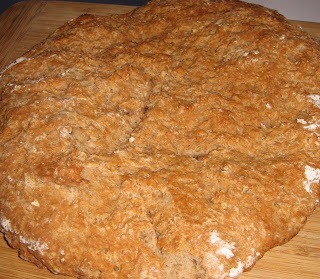Let it rise
Where do you find yeast in the supermarket? The active kind. Funny how they refer to it that way. "Active yeast". Isn't that the whole point of the thing? If we were okay with passive yeast we'd have settled for matzoh. Anyway, where is it? I've looked in three supermarkets now, mostly in the flour aisle, to no avail. At Whole Foods, Wally said, "We should ask someone" but I was stubborn, like men are with directions, and preferred to go blustering about, getting increasingly irritated, stripping off my hat, then scarf, then jacket pushing and squatting and craning my head through the aisles dragging Wally behind me.
I can't remember the last time someone at a grocery store knew where something was. It's true I sometimes I ask for something fairly remote (vegetarian Worcestershire sauce, although it's likely to be stocked somewhere near the standard anchovy kind), but usually it's something someone with even a barebones grasp of the store's overall layout should be able to locate. But usually you just end up following the person who works there around, wondering whether it's rude after a minute or so to say, "Nevermind, it's really not that important". Like are you locked in, now, because you were the one who initiated the search, or is there a statue of limitations on your role in it? Are you allowed to call it off, or at the very least, withdraw?
“That’s okay, thanks for looking though.”
“No we have it, we have it.”
“Really that’s okay. I have to--”
“Gimme a second.”
I have still never figured out whether the store across the street from us has tofu but no one knows where, or if they just don't carry it. "I don't think we carry that." You're making it sound like more work than it is. One assumes you carry it when stocking the shelves, but after that, you let go.
So I haven't asked anyone yet where I might find the active yeast, and I haven't found it. But it's less aggravating to seek and not find than to seek and ask and still not find.
What prompted the search was that I started to notice something a bit more obvious than mold on a petri dish killing a strain of bacteria, which was that the more expensive, fresh and tasty/healthy a bread was, the faster it got stale. Or I guess I should say, I became more aware of that phenomenon. Maybe everyone but me was already aware of that, just like everyone but me by the age of 20 knew how to make pasta without measuring out the number of cups of water or setting a timer for how long to cook it. And yes - if you asked me, I would have known that fresher bread gets stale faster, but it's never really affected me before. But lately it started irking me that you buy this nice bread and within 2 days if you don't put it in the fridge (which kinda defeats the purpose) it starts to go bad. The cheap, soft package of sliced whole wheat, air and calcium propionate that passes for bread in the supermarket--the kind we usually buy--lasts forever!! Isn't that great? With all the sandwiches I've been packing off for lunches lately, I just started thinking about how gross it is that that kind of bread lasts so long.
Hence my determination to make my own bread even if it may be, as my brother-in-law put it, one of those things that ends up costing more than the store-bought kind and not being worth it. But I can't find yeast, active or even lethargic. So today after playing outside in the snow with neighbors for Squirrel Appreciation Day (yes it really is a day, and it's today - so start appreciating them!) Wally fell asleep on the couch while Alex worked on recording a band in the back room and I scurried around looking for a recipe for bread that would rise by itself. I found one. It is the most amazing thing.
And it's just flour mixed, oats, the tiniest bit of butter, two teaspoons of sugar, baking soda not to be confused with baking powder (both are used) and yogurt. That's it. Is whatever that active ingredient -- live culture?--that's in yogurt responsible for the rising? I don't know. But you only have to knead the thing fives times and there's no covering a bowl with a towel, waiting 5 hours, then punching it down or any of that high-maintenance stuff you have to do when yeast is involved. I've been having so much fun making stuff lately, inspired by my friend's sister's food blog 5 second rule and the new book she has coming out from Running Press called Ripe: A Fresh, Colorful Approach to Fruits and Vegetables. She's a great writer, one of those where, even if you're like me you just recently learned how to make instant rice, you still enjoy reading her posts about making stuff you'll probably never make.
Though I will keep making this homemade Irish bread! Here's the recipe I used. I didn't end up using any milk in mine and I only baked it for 31 minutes.
So you can keep your Sodium Stearoyl Lactylate, Calcium Dioxide and Calcium Sulfate (until sometime next week when I am schvitzing and cursing in the most crowded and poorly designed ever Whole Foods, and end up resorting to Arnold or Matthew or Pepperidge Farm. When it's possible, though, when we have time, let's trade in convenience for health, happiness and good taste.
In the Old Testament, Chapter 6 of The Book of Ezra describes the feast of unleavened bread. The Israelites had a pretty convincing argument for not being willing to slow down long enough to let their bread rise (Pharaoh, escape from slavery, etc.) Our reasons are maybe a little less compelling. So let’s take a hint from a verse that appears later in the same book.
“Rise up; this matter is in your hands. We will support you, so take courage and do it," (Ezra 10:4).
Good advice for almost any goal.
Good advice for almost any goal.



Hahahaha - this one had me laughing out loud. And let's add Ezekial 4:9 to the mix:
ReplyDeleteTake thou also unto thee wheat, and barley, and beans, and lentiles, and millet, and fitches, and put them in one vessel, and make thee bread thereof, according to the number of the days that thou shalt lie upon thy side, three hundred and ninety days shalt thou eat thereof.
Healthy and it'll last more than a year. Though verily, I don't know if one hearty portion will fill you up for that long, or it's one hell of a big batch.
Josh says it's with the flour and sugar. Around here, bread doesn't really have a chance to go bad :)
ReplyDeletei think at whole foods it's in the flour aisle...
ReplyDeleteThanks for that Ezekial quote Hawkeye - and for making me laugh once again. I think it was the hearty portion - metaphorically? Though the big batch is really funny, too.
ReplyDeleteflour & sugar? so I guess that's how muffins rise, as well.
WF flour aisle was stripped bare of yeast when I went..BA thot maybe spice now?
Yet another reason to make your own bread!
ReplyDeletehttp://health.yahoo.net/experts/eatthis/5-grossest-foods-supermarket
So, I have gone through the same how the hell can store bought bread last eternally issue and now make my own. I use a no-knead recipe (does require yeast, 10 minutes the night before you want to bake it and a REALLY hot oven). I use 2 C bread flour, 1 cup whole wheat and a Tablespoon ground flaxseed in my recipe. It is a crusty bread, but we use it for everything (sandwiches, toast, etc.) SO, if you can find the damn yeast, this is an easy way to go.
ReplyDeletehttp://www.nytimes.com/2006/11/08/dining/081mrex.html
Try it out.
Roo and Moo ...how on earth do you make your own everything? Thanks for this recipe. I want to try it (if I can find the damn yeast..I think I saw enough to last several lifetimes at BJs).
ReplyDelete